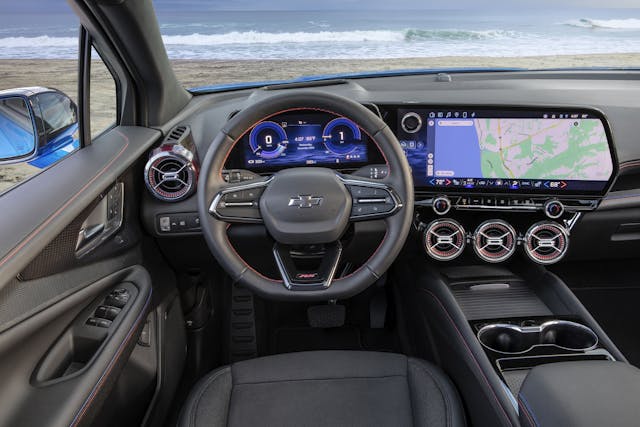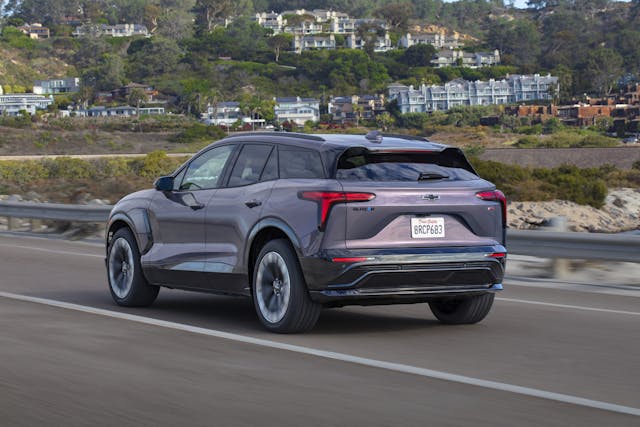“Updated” Chevy Blazer EV Back on Sale with Big Price Drop
Crashing infotainment screens. Looping infotainment screens. Failures to charge. Inoperable window switches. When Chevrolet first launched its all-electric Blazer, owners and reviewers alike faced these problems, and more. Even more concerning, technicians at dealerships were reportedly often confused about remedies.
Today, Chevrolet issued a software update that should fix everything, it says. Along with the update is news that the vehicle will go back on sale after the automaker issued a stop-sale on December 22, 2023. The Blazer EV will return to market with an entry-level price slash of more than $6000.
“We have made significant software updates that will improve features and functionality to deliver on the high expectations of our customers,” reads a statement from Chevrolet spokesperson Leslie Rajewski. “We’re confident these improvements will address concerns heard from some early owners and as promised, we’re carrying learnings over to other products in GM’s lineup.”
Indeed, most new-car buyers expect a functioning display, especially when it concerns one of the largest purchases they will make in their lives.

Thankfully, the Blazer—which is assembled in Mexico, at the same plant that makes its battery pack—is also eligible for the full federal tax credit of $7500. (Qualifications for these refunds, thanks to the recent Inflation Reduction Act and revised U.S. Treasury guidelines for 2024, have been a moving target.) Early customers paying MSRP when Chevrolet launched only the most luxurious and highest-powered Blazer, the AWD RS, in August, paid just over $60,000 before tax credits. (We reviewed that model about a week before the stop-sale was issued.) Chevy had planned to roll out the mid-spec Blazer 2LT AWD this fall.
All newly available Blazers are receiving a price cut: $5620 off the RS RWD and the RS AWD, and $6520 off the LT AWD. Including destination and handling but not the tax credit, those trims now cost $56,170, $54,595, and $50,195, respectively. Chevy will announce prices for the other trims—the RS FWD and the 557-hp SS—closer to when those variants become available. The entry-level trim, the LT FWD, will start “under $50,000.”
Many manufacturers have cut prices for their EVs in recent months, both in response to changing tax credit criteria and waning customer demand. In the case of the software-remedied Blazer, however, the discount has the appearance of an apology. We’re willing to bet that current owners who paid full boat would probably appreciate five grand back in their pockets.
Did you buy a Blazer EV? Know someone who did? Drop us a comment below and share what you know.
***
Check out the Hagerty Media homepage so you don’t miss a single story, or better yet, bookmark it. To get our best stories delivered right to your inbox, subscribe to our newsletters.



$50-$60k, I feel I can do better for the money than this battery powered toaster.
They should put the weight of the vehicle in all the advertisements with a warning about how fast you’ll go through brakes and tires.
“Aw, c’mon.” It’s *only* 5400 pounds. I have a one-ton dump truck that weighs over 7000 empty (gets around parking lots well, unlimited trunk space, and gets decent mileage too). So if your idea of a sporty ride is a dump truck, Blazer may be for you. We may be coming full circle in this genre.
Also I see a lot of these EV’s advertised as “0-60 in under 3 seconds” or whatever super low time it is. A version of this car claims sub 4 second 0-60. Who needs to go that fast? Yes I know it’s fun. Why not build an EV to maximize range? And why don’t they make the roof and hood out of flexible solar PV panels for all day in the sun charging… you know, while you’re at work?
Great ideas! I couldn’t agree more.
Regarding brakes, I drove my Mustang Mach E 2500 miles from NY to LA and touched the brake pedal maybe 10 times for the whole trip. With 1-pedal driving, you just don’t use the brakes and they literally are no longer a “wear” item. 1-pedal driving is one of the best features of driving an EV once you experience it.
As for tires, I guess they wear out quicker due to the heavier weight – I’m still on the factory originals at 30,000 miles – but the tire mileage warranty doesn’t penalize the buyer for the extra load placed on the tires. Admittedly, tire warranties aren’t worth much although I’ve had decent experience buying Michelins at Costco on the few occasions where the warranty was somewhat helpful.